National
Nepal human rights body set to retain its ‘A’ global ranking
Global alliance urges rights watchdog to align with global standards, ensure one-third commissioners are women.
Binod Ghimire
The National Human Rights Commission has successfully defended the Global Alliance of National Human Rights Institutions (GANHRI) review to retain its global ‘A’ ranking.
After quizzing the commission’s officials in Geneva, Switzerland on March 17, the GANHRI’s Subcommittee on Accreditation (SAC) has recommended to its bureau that the current highest ranking be retained.
“We have received official information from the SAC that it has recommended to give continuity to our ‘A’ ranking,” Murari Kharel, the commission’s secretary, who was present in defence, told the Post. Commissioner Manoj Duwady, Kharel and Joint-secretary Navaraj Sapkota had answered the questions from the SCA panel, which had representatives from New Zealand, South Africa, Honduras, and Serbia.
After the review, the sub-committee presents a report and recommendations to the GANHRI Bureau, which is responsible for making the final decision on the accreditation of national human rights institutions. The bureau typically takes around four weeks to come up with a final decision.
“Generally, the bureau approves the recommendations,” said Kharel. While informing about its decision, the SAC also has asked the commission to continue advocacy and lobby for its new law.
Although the commission on September 3, 2024 submitted a draft bill for its new Act to the Prime Minister’s Office (PMO), the government has yet to finalise it. The bill is under evaluation at the Ministry of Finance. Draft bills are sent to the finance ministry for consent to see if their implementation increases the burden on state coffers.
Kharel said the SAC also has asked the commission to continue its advocacy for financial autonomy and ensure that at least one-third of the commissioners are women. “It has also said there should be legal instruments in place to allow removal of commissioners who fail to perform effectively,” said Kharel.
National human rights institutions undergo reviews every five years. However, special reviews can be conducted at any time if there are complaints. If there are no complaints, the commission will face its next review in 2030.
In its 25 years of history, the country’s constitutional human rights watchdog has faced 19 reviews by GANHRI.
The commission went through special accreditation reviews in 2022 and 2023, following complaints from civil society organisations alleging that the appointment of the chairperson and members in the commission was inconsistent with domestic laws and essential requirements of the Paris Principles. In October 2023, the global alliance decided not to downgrade its global ‘A’ status—for the time being.
Unlike previous reviews, this one was a routine periodic review.
GANHRI has long been asking the commission to align its law with the Paris Principles.
Adopted in 1993 by the United Nations General Assembly, the Paris Principles set six criteria that national human rights institutions must follow. These include autonomy from the government and the independence guaranteed by the constitution, besides adequate competence, pluralism and the availability of resources and powers to carry out investigations.
As Nepal has announced candidacy for a seat on the United Nations Human Rights Council, retention of the commission’s ‘A’ status has strengthened its position. Only countries where the human rights commission hold the highest ranking are considered to have a strong human rights record.




 13.12°C Kathmandu
13.12°C Kathmandu















